In today’s digital age, large language models (LLMs) are at the forefront of artificial intelligence. These advanced systems possess the remarkable ability to understand and generate human-like text, making them indispensable across a wide range of applications. Among the leading contenders in this dynamic field are Gemini 1.5 Pro, developed by Google, and ChatGPT 4o, engineered by OpenAI.
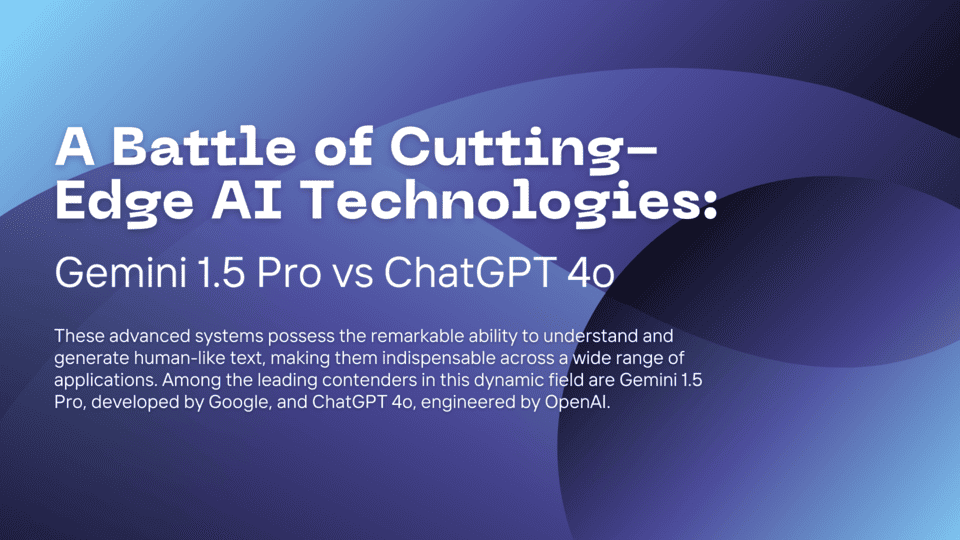
As organizations and individuals increasingly harness the power of LLMs to boost productivity and creativity, it becomes crucial to understand the distinct features and capabilities of these models. Gemini 1.5 Pro showcases significant advancements in context management and multimodal functionality, positioning it as a compelling option in the AI landscape. On the other hand, ChatGPT 4o—where ‘o’ stands for ‘omni’—has gained widespread acclaim for its superior reasoning abilities and seamless adaptability across various applications.
This article aims to provide a comprehensive comparison of Gemini 1.5 Pro vs ChatGPT 4o, exploring their developmental backgrounds, technical specifications, user experiences, and real-world applications. By examining these aspects, we will highlight the strengths and weaknesses of each model, empowering readers to make informed decisions tailored to their specific needs and use cases.
Join us as we delve into the intricacies of these powerful language models and discover what sets them apart in the pursuit of AI excellence!
Model Development: Gemini 1.5 Pro vs. ChatGPT 4o
The development of large language models showcases the rapid evolution of artificial intelligence. This section highlights their release dates, developers, and key improvements that distinguish these models in the AI landscape.
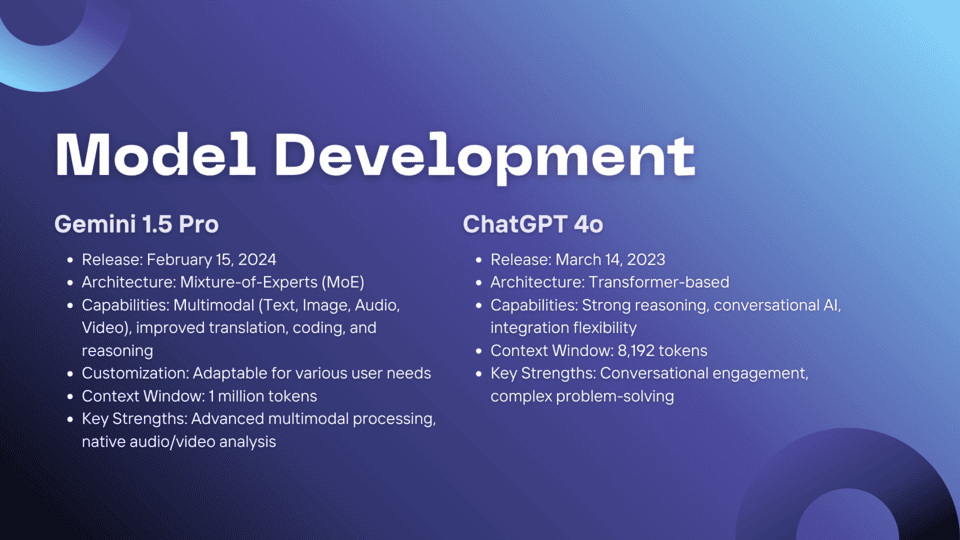
Gemini 1.5 Pro
Gemini 1.5 Pro is a state-of-the-art multimodal AI model developed by Google DeepMind, officially released on February 15, 2024. It is part of the Gemini series, which began with Gemini 1.0 in December 2023, featuring various models such as Ultra, Pro, and Nano. The initial release of Gemini 1.5 Pro introduced significant enhancements over its predecessors, particularly in performance and context management.
The model employs a multimodal mixture-of-experts (MoE) architecture, allowing it to process and understand text, images, audio, and video. This enables users to engage with the model across different modalities, making it a versatile tool for diverse applications. Another standout feature is its extensive context window, which supports up to 1 million tokens, significantly surpassing the limits of many competing models. This expansive context allows for better reasoning and understanding of larger datasets, facilitating more complex queries and interactions.
Several key improvements are seen in Gemini 1.5 Pro, including enhanced performance across various tasks such as translation, coding, and reasoning. It also introduces native audio understanding, allowing it to process voice inputs directly, and supports video analysis from linked external sources. Furthermore, the introduction of Gem customization enables users to create tailored versions of the AI for specific tasks, enhancing its adaptability to individual needs. As a result, Gemini 1.5 Pro positions itself as a powerful player in the AI landscape, catering to a wide range of user requirements.
ChatGPT 4o
ChatGPT 4o, released on March 14, 2023, by OpenAI, represents the latest evolution in the ChatGPT series, following the successful ChatGPT 3.5. This model has gained a reputation for its exceptional reasoning abilities and seamless integration into various applications, making it a popular choice among developers and businesses alike.
The advancements in ChatGPT 4o build upon the strengths of its predecessors, focusing on enhancing contextual understanding and problem-solving capabilities. While earlier versions primarily excelled in generating coherent text, ChatGPT 4o introduces improved performance in complex reasoning tasks, making it particularly effective for applications that require in-depth analysis and coding.
One of the notable features of ChatGPT 4o is its ability to handle a context window of up to 8,192 tokens, which, while smaller than Gemini 1.5 Pro’s, still allows for substantial input processing. It is designed to engage users in meaningful conversations and provide insightful responses across a variety of topics.
OpenAI continues to refine ChatGPT 4o by incorporating user feedback to enhance its functionality and expand its application scope. The model’s versatility and robust capabilities have established it as a leading option in the realm of LLMs, appealing to a diverse user base seeking intelligent and responsive AI solutions.
Together, Gemini 1.5 Pro and ChatGPT 4o illustrate the remarkable progress in AI technology, each offering unique features and strengths that cater to different user needs and preferences.
Technical Specifications: Gemini 1.5 Pro vs. ChatGPT 4o
Delving into the technical specifications of LLMs is essential for understanding their capabilities and suitability for diverse applications. This section explores the architectural designs, context window limitations, and token usage of Gemini 1.5 Pro vs ChatGPT 4o, providing insights into how these models process and generate text, as well as the pricing structures that govern their accessibility.
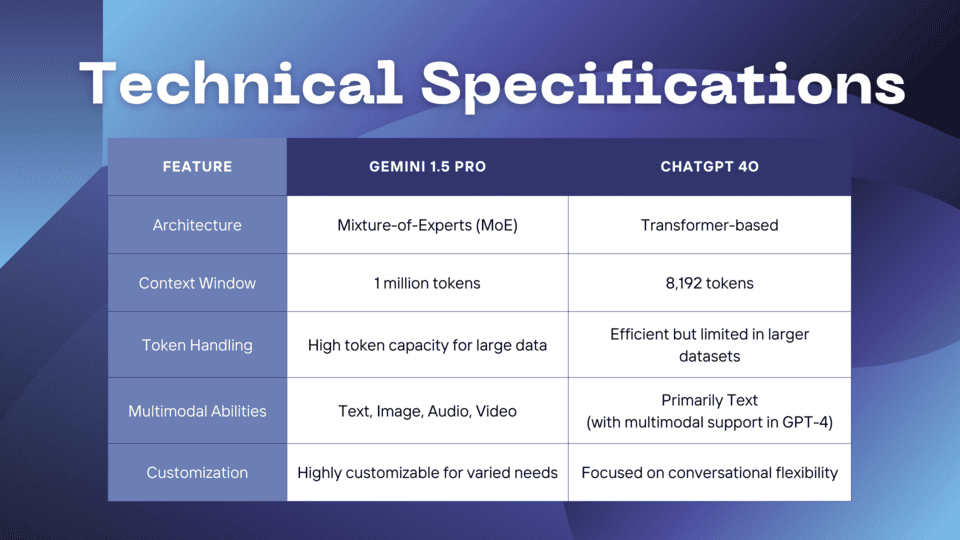
Architecture
As mentioned, Gemini 1.5 Pro utilizes a mixture-of-experts (MoE) architecture, a sophisticated design that enhances its efficiency and response quality. This approach allows the model to dynamically activate different subsets of parameters, referred to as “experts,” based on the specific input it receives. By selectively engaging only the most relevant expert pathways, it achieves a higher level of contextual awareness and nuanced output. This architecture not only improves computational efficiency but also enables the model to scale effectively without a linear increase in computational demands.
ChatGPT 4o, on the other hand, is built on a transformer-based architecture, which has become the standard for many advanced language models. This architecture employs self-attention mechanisms that allow the model to weigh the importance of different words in a sentence, facilitating a deep understanding of context and meaning. ChatGPT 4o enhances the traditional transformer model with optimizations that improve its reasoning capabilities and responsiveness. While it does not utilize the MoE approach, its design allows for effective handling of conversational AI tasks, making it adept at generating coherent and contextually relevant responses.
Context Window and Token Limitations
Gemini 1.5 Pro supports an impressive context window of up to 1 million tokens, a significant advancement that enables it to process and analyze large volumes of data simultaneously. It allows users to engage with the model in more complex and nuanced ways, such as analyzing lengthy documents or multi-hour video content without losing context. The model’s ability to maintain coherence over such an extensive context window sets a new benchmark for large-scale foundation models.
In contrast, ChatGPT 4o has a context window of 8,192 tokens. While this is substantial and sufficient for many conversational applications, it falls short of the capabilities offered by Gemini 1.5 Pro. The smaller context window may limit the model’s ability to handle very long documents or extensive datasets in a single interaction, which could affect its performance in tasks requiring deep contextual understanding over larger inputs.
Pricing Models
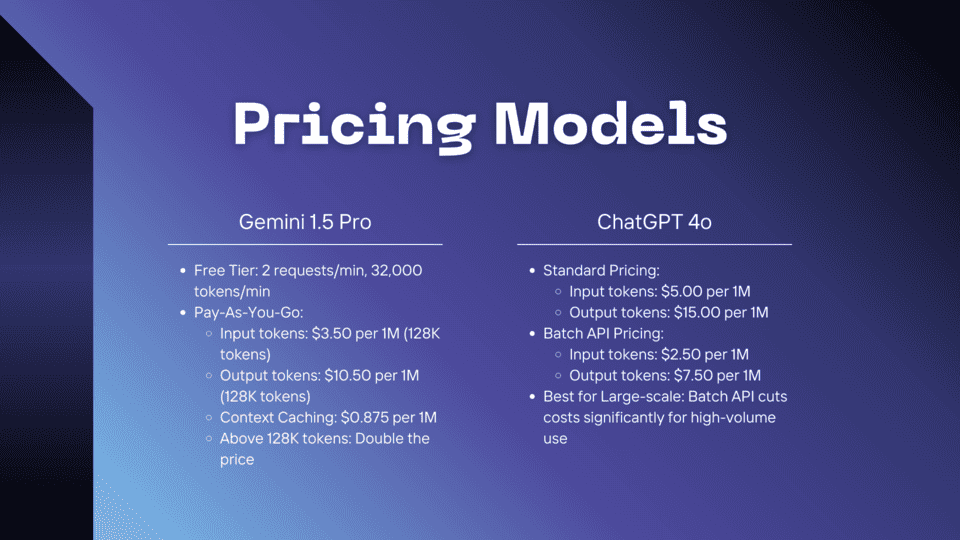
When it comes to pricing, both models adopt distinct approaches for token usage.
Gemini 1.5 Pro
Free Tier: Gemini 1.5 Pro offers a free tier, making it accessible for users who are in the testing phase or have minimal usage requirements. Under this tier, users can make up to 2 requests per minute and process 32,000 tokens per minute, with a daily limit of 50 requests. While the free tier is excellent for experimenting with the service, its strict usage limits make it unsuitable for larger, ongoing projects.
Pay-As-You-Go Pricing: For users needing more robust AI capabilities, Gemini 1.5 Pro provides a pay-as-you-go model. For prompts up to 128K tokens, the cost is $3.50 per 1 million input tokens and $10.50 per 1 million output tokens. Additionally, context caching is available at $0.875 per 1 million tokens, allowing for more complex and contextually aware interactions. However, if prompts exceed 128K tokens, the costs double, with input tokens priced at $7.00 per 1 million and output tokens at $21.00 per 1 million, along with context caching at $1.75 per 1 million tokens. This model is flexible and scalable, but costs can rise quickly with increased prompt length and context caching needs.
ChatGPT 4o
Standard Pricing: For ChatGPT 4o, the standard pricing model charges $5.00 per 1 million input tokens and $15.00 per 1 million output tokens. This pricing applies to general usage without any special bulk processing discounts. This model is designed for users who need reliable, high-quality AI interactions without the need for processing large volumes of data all at once. It’s a straightforward approach, though it can become costly for extensive usage.
Batch API Pricing: To cater to large-scale operations, ChatGPT 4o offers a Batch API pricing model, which significantly reduces costs to $2.50 per 1 million input tokens and $7.50 per 1 million output tokens. This option is particularly beneficial for businesses or applications that require processing substantial amounts of data efficiently. The Batch API makes ChatGPT 4o more competitive by cutting costs in half, making it an attractive option for organizations looking to scale their AI services.
Ultimately, the choice between ChatGPT 4o and Gemini 1.5 Pro depends on your specific needs. ChatGPT 4o is a strong contender for large-scale operations, particularly with its Batch API, which offers significant cost reductions. In contrast, Gemini 1.5 Pro is better suited for users who require flexibility, lower entry costs, and are dealing with shorter prompts, but it may become more expensive when factoring in context caching and longer prompt requirements.
User Experience: Gemini 1.5 Pro vs. ChatGPT 4o
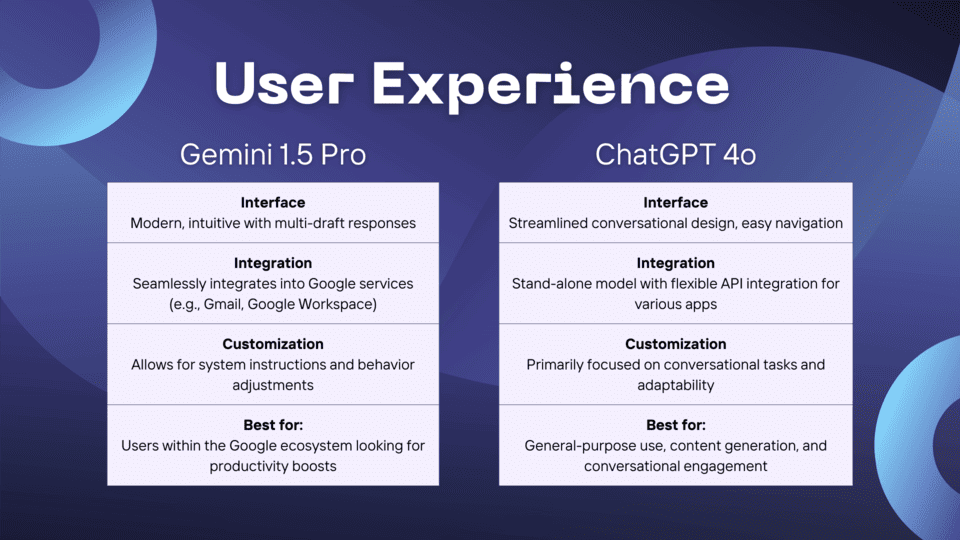
User experience is a critical aspect of both Gemini 1.5 Pro and ChatGPT 4o, with each model offering a distinct interface. Gemini 1.5 Pro features a modern and intuitive interface, allowing users to set system instructions and customize the model’s behavior. One feature to note is its ability to generate multi-draft responses, which enables users to explore different output options. In contrast, ChatGPT 4o provides a streamlined conversational interface that is easy to navigate, making it accessible for a wide range of users. While it lacks the multi-draft functionality, its design facilitates engaging and coherent interactions.
As for integration, Gemini 1.5 Pro is seamlessly embedded into Google services, such as Gmail,to allow users to efficiently generate email responses and enhance productivity within the Google ecosystem. On the other hand, ChatGPT 4o operates as a standalone model, focusing on providing robust conversational capabilities that can be easily implemented across various applications. While both models prioritize user experience, Gemini 1.5 Pro’s integration offers added convenience for users within Google’s suite of tools, whereas ChatGPT 4o emphasizes simplicity and versatility in its standalone functionality.
Real-World Application: Gemini 1.5 Pro vs. ChatGPT 4o
Gemini 1.5 Pro and ChatGPT 4o are transforming various industries through their unique capabilities. In this section, we’ll highlight specific use cases for each model, showcasing how they excel in tasks ranging from content analysis to coding assistance.
Use Cases for Gemini 1.5 Pro
Gemini 1.5 Pro excels in various scenarios due to its extensive context window and multimodal capabilities. With a context window of up to 1 million tokens, it can analyze lengthy documents, books, and complex codebases without losing coherence. This makes it particularly effective for tasks such as:
- Long-form content analysis: Gemini can summarize or extract key insights from extensive texts, aiding researchers and writers in managing large volumes of information.
- Multimodal question answering: The model can integrate information from text, images, audio, and video, allowing it to respond to queries that span multiple formats. For instance, it can analyze a video and provide a summary or answer questions about its content.
- Intelligent assistants and chatbots: Gemini 1.5 Pro can power conversational AI applications that require understanding and reasoning over multimodal inputs, enhancing customer service and user engagement.
- Code analysis and generation: The model’s ability to understand and generate code makes it suitable for software development tasks, including suggesting improvements and explaining code functionality.
These features position Gemini 1.5 Pro as a versatile tool across industries such as education, content creation, and software development.
Use Cases for ChatGPT 4o
ChatGPT 4o shines in scenarios that require strong reasoning and coding capabilities. Its architecture is particularly well-suited for tasks such as:
- Complex problem-solving: ChatGPT 4o can tackle intricate queries that demand logical reasoning and structured thought processes, making it ideal for academic research or analytical tasks.
- Coding assistance: The model excels in generating and debugging code snippets, making it a valuable resource for developers. It can provide explanations for code segments and suggest optimizations, enhancing productivity in software projects.
- Conversational agents: ChatGPT 4o is effective in customer service applications, where it can engage users in meaningful dialogue, answer questions, and provide support based on user input.
- Content generation: The model’s ability to produce coherent and contextually relevant text makes it useful for creating articles, reports, and other written materials.
These strengths make ChatGPT 4o a preferred choice for users seeking robust reasoning capabilities and coding support in their applications.
Test Gemini 1.5 Pro and ChatGPT with ChatBot Pro!
In the rapidly evolving landscape of large language models, Gemini 1.5 Pro and ChatGPT 4o represent two distinct approaches to AI development. While the former boasts an impressive context window and multimodal capabilities, the latter has established itself as a leader in reasoning, coding, and conversational AI.
Our analysis has shown that each model excels in specific areas. Gemini 1.5 Pro’s extensive context window and integration with Google services make it a compelling choice for tasks that require processing large volumes of information or seamless collaboration within the Google ecosystem. ChatGPT 4o, on the other hand, shines in its ability to engage in meaningful dialogue, tackle complex problems, and generate high-quality code, appealing to a wide range of users from individual developers to enterprise customers.
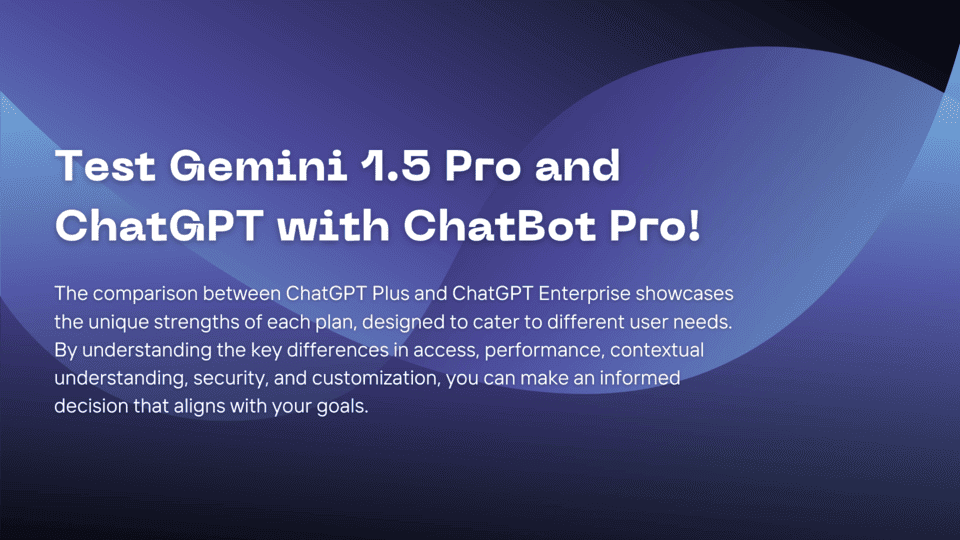
Ultimately, the winner between Gemini 1.5 Pro vs ChatGPT 4o depends on the specific needs and preferences of the user. To help you make an informed decision, we encourage you to try out AI-Pro’s ChatBot Pro, which allows you to switch between different AI models when producing results. By experiencing the capabilities of these models firsthand, you can determine which one best suits your requirements and workflow.




